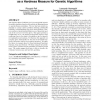Free Online Productivity Tools
i2Speak
i2Symbol
i2OCR
iTex2Img
iWeb2Print
iWeb2Shot
i2Type
iPdf2Split
iPdf2Merge
i2Bopomofo
i2Arabic
i2Style
i2Image
i2PDF
iLatex2Rtf
Sci2ools
GECCO
2007
Springer
2007
Springer
Fitness-proportional negative slope coefficient as a hardness measure for genetic algorithms
The Negative Slope Coefficient (nsc) is an empirical measure of problem hardness based on the analysis of offspring-fitness vs. parent-fitness scatterplots. The nsc has been tested empirically on a large variety problems showing considerable reliability in distinguishing easy from hard problems. However, neither a theoretical justification nor a theoretical analysis of the nsc have ever been given. This paper presents a modification of nsc, the fitness-proportional negative slope coefficient (fpncs), for which it is possible to give a theoretical explanation and analysis. To illustrate the approach we compute fpnsc theoretically for the class of invertible functions of unitation, and for two mutation operators. We apply the theory to compute fpnsc for three benchmark functions: Onemax, Trap and Onemix. We then compare the predictions of fpnsc with the success probability recorded in actual runs. The results suggest that fpnsc is able to broadly discriminate between easy and hard GA pr...
Fitness-proportional Negative Slope | GECCO 2007 | Keywords Negative Slope | Negative Slope | Optimization |
| Added | 16 Aug 2010 |
| Updated | 16 Aug 2010 |
| Type | Conference |
| Year | 2007 |
| Where | GECCO |
| Authors | Riccardo Poli, Leonardo Vanneschi |
Comments (0)

